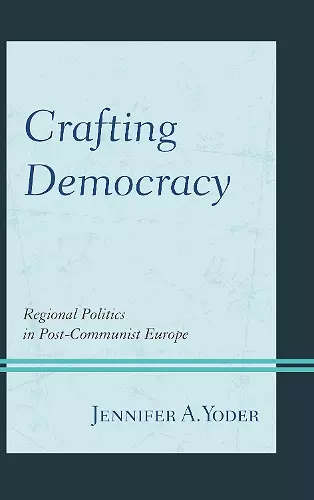Crafting Democracy
Regional Politics in Post-Communist Europe
Format:Hardback
Publisher:Bloomsbury Publishing PLC
Published:7th Feb '13
Currently unavailable, and unfortunately no date known when it will be back

The importance of subnational regions to politics, governance, and economic development in Western Europe has long been recognized. However, far less is known about recent steps to introduce a regional level of politics in East Central Europe. Reforms there are part of the larger process of crafting democracy; that is, regional reforms are linked to the economic and political transition away from communism and toward “Europe,” specifically the European Union.
Crafting Democracy offers an important comparative analysis of the process and outcomes of region-building in the four Visegrád countries. Jennifer A. Yoder investigates why some but not other post-communist countries chose to introduce a regional level of elected government. In the 1990s, for example, Poland boldly took the lead in regionalization, while the Czech Republic and Slovakia lagged behind. Hungary, meanwhile, declined to create regions. The author argues that these regional reform processes have potentially far-reaching implications for state-society relations, political participation, and policymaking at the domestic level. The emergence of new actors at the subnational level, moreover, creates opportunities for cross-border and European Union–level initiatives.
Since the collapse of the communist regimes in 1989, eastern Europe has generally been less supportive of regionalism than western Europe, although the decentralization of the state and the reallocation of power among different levels of government were considered important elements of the democratization process during the 1990s. In this five-chapter book, Yoder (Colby College) asks why this is the case. By comparing and contrasting the central European countries of Poland, the Czech Republic, Slovakia, and Hungary, Yoder examines the key role of political elites and political advantage in determining the scope and pace of territorial-administrative reform and regionalization. With chapters dedicated to individual countries, this well-written and well-argued volume will be of interest for students of local government, regional studies, and transition politics in eastern Europe and beyond. Summing Up: Recommended. Upper-division undergraduate, graduate, research, and professional collections. * Choice Reviews *
The why, how, and consequences and implications for democratic transformation from subnational regional governments in four post-communist East Central European (ECE) and EU countries are very cogently analysed in Jennifer Yoder’s study. . . .The book is a useful resource as well as a very carefully argued study of politics as the major determinant of institutional change in post-communist countries. Its framework of analysis and insights is especially welcome to those like myself who envisage real democratic change in countries like Russia, much less further along than these four, ultimately arising from viable subnational government and politics. * Europe-Asia Studies *
Why has regionalism not taken off in Central and Eastern Europe the way it has in much of Western Europe? Jennifer Yoder presents a carefully researched and convincing explanation, focused on the role of political elites and political advantage. This is an important book for both students of regional studies and transition scholars. -- Michael Keating, University of Aberdeen
Jennifer Yoder provides us with an exemplary comparative analysis of the processes of regionalization and territorial-administrative reform in four East Central European countries following the end of communism. Well-researched, clearly written, and lucidly argued, Yoder’s study shows how the ECE countries are different from their Western European neighbors, and also from each other. -- Michael J. Baun, Valdosta State University
ISBN: 9781442215986
Dimensions: 238mm x 162mm x 24mm
Weight: 526g
252 pages